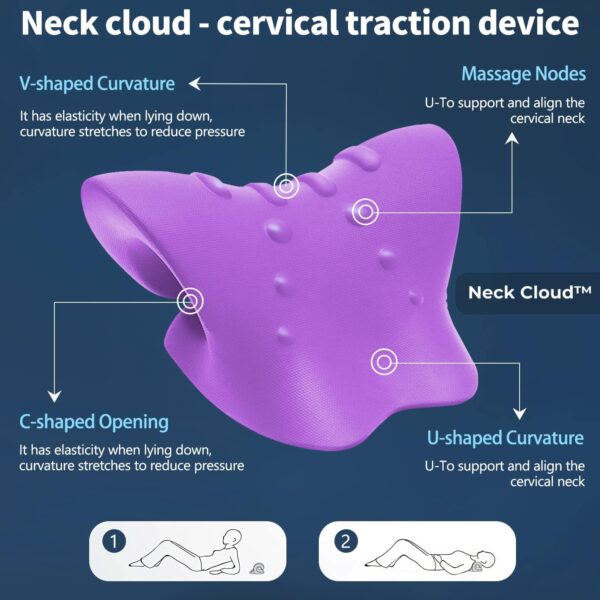Experience the Advantages of the Neck Cloud for Neck and Shoulder Relief
Experience the Advantages of the Neck Cloud for Neck and Shoulder Relief
Blog Article
The Effect of Stress on Neck Discomfort: Approaches for Reducing Stress and Pain
In today's busy globe, it's obvious that stress has actually become a common factor in the beginning and worsening of neck pain. The complex relationship between stress and anxiety and muscle mass stress frequently leaves people looking for remedy for the discomfort that follows. By exploring targeted methods focused on reducing tension and advertising leisure, one can begin to deal with the source of neck pain and work in the direction of an extra well balanced state of well-being. Join us on a journey to unwind the influence of stress on neck pain and find reliable ways to reduce discomfort and improve overall high quality of life.
Understanding Stress-Related Neck Pain
Stress-related neck discomfort can materialize as stress, stiffness, or pain in the neck and shoulder location. The connection between stress and neck discomfort lies in the body's physical action to stress and anxiety, which can result in muscle mass stress and rigidity in the neck muscles.

Identifying Common Stress Areas
Often experienced by individuals under tension, tension areas in the body can provide important insights right into the physical manifestations of psychological pressure. One common stress area is the neck, where stress often shows up literally. Stress headaches, stiff neck muscular tissues, and restricted variety of activity prevail symptoms of stress-related neck tension. The shoulders are one more typical location where stress gathers. Anxiety can trigger the muscle mass in the shoulders to tighten, causing discomfort and discomfort. Furthermore, the upper back is prone to tension accumulation, particularly in individuals that experience chronic stress. Poor posture and long term resting can worsen stress in this area. The jaw is likewise a typical area for stress-related stress, as lots of individuals clinch their jaw or grind their teeth when emphasized. Recognizing these common stress locations can assist people recognize the physical signs of stress and take steps to address them prior to they intensify into persistent discomfort or discomfort.
Carrying Out Relaxation Methods
To efficiently manage stress-related tension in the body, carrying out relaxation techniques is crucial. Relaxation techniques are beneficial tools for lowering neck discomfort triggered by stress. Deep breathing exercises can aid relax the mind and loosen up strained muscular tissues in the neck and shoulders (neck cloud). Exercising mindfulness reflection can additionally be advantageous in relieving tension and advertising leisure. Dynamic muscle leisure, where you systematically strained and after that kick back various muscular tissue groups, can release built-up stress in the neck area. Additionally, activities like yoga and tai chi include both physical motion and relaxation, making them reliable methods for reducing tension and neck pain. this Taking normal breaks throughout the day to stretch and relax can prevent muscle rigidity and tension from accumulating. By incorporating these relaxation techniques into your day-to-day regimen, you can aid take care of stress and anxiety levels, decrease tension in the neck, and ease discomfort connected with stress-induced neck discomfort.
Including Self-Care Practices
Incorporating self-care methods is crucial for keeping general wellness and handling stress-related neck pain efficiently. Participating in normal exercise, such as gentle stretching exercises or yoga, can assist ease stress in the neck and shoulders. Practicing great stance throughout the day and taking constant breaks from long term resting or screen time can likewise prevent strain on the neck muscles.
Additionally, prioritizing sufficient sleep and developing a regular sleep regimen can contribute considerably to decreasing tension levels and promoting relaxation. Producing a calming bedtime routine, such as reviewing a go now publication or taking a warm bathroom, can aid prepare the mind and body for restful sleep. In addition, keeping a balanced diet regimen abundant in nutrients and staying hydrated can support overall health and wellness and decrease swelling that might exacerbate neck discomfort.
Integrating mindfulness methods, such as deep breathing workouts or meditation, can help manage tension and promote relaxation. Taking some time for oneself, involving in leisure activities, and establishing limits to protect personal time are also crucial elements of self-care that can add to decreasing tension and easing neck discomfort.
Looking For Professional Assistance
Exactly how can individuals efficiently resolve persistent neck pain that is impacting their everyday life and wellness? Seeking specialist assistance can be a vital step in handling and easing neck pain.
Chiropractic doctors concentrate on spinal control strategies to improve alignment and reduce tension in the neck area. Physiotherapists use targeted workouts and stretches to reinforce muscular tissues, improve versatility, and enhance total neck function. Orthopedic experts can provide advanced clinical interventions such as shots or surgical alternatives for extreme cases of neck discomfort.
Conclusion

Stress-related neck discomfort can materialize as tension, tightness, or discomfort in the neck and shoulder location. The connection in between anxiety and neck discomfort exists in the body's physical action to tension, which can result in muscle mass stress and rigidity in the neck muscle mass. Tension headaches, stiff neck muscles, and limited range of movement are usual symptoms of stress-related neck stress. By including these leisure methods into your everyday routine, you can assist take care of stress and anxiety degrees, minimize stress in the neck, and ease discomfort associated with stress-induced neck discomfort.

Report this page